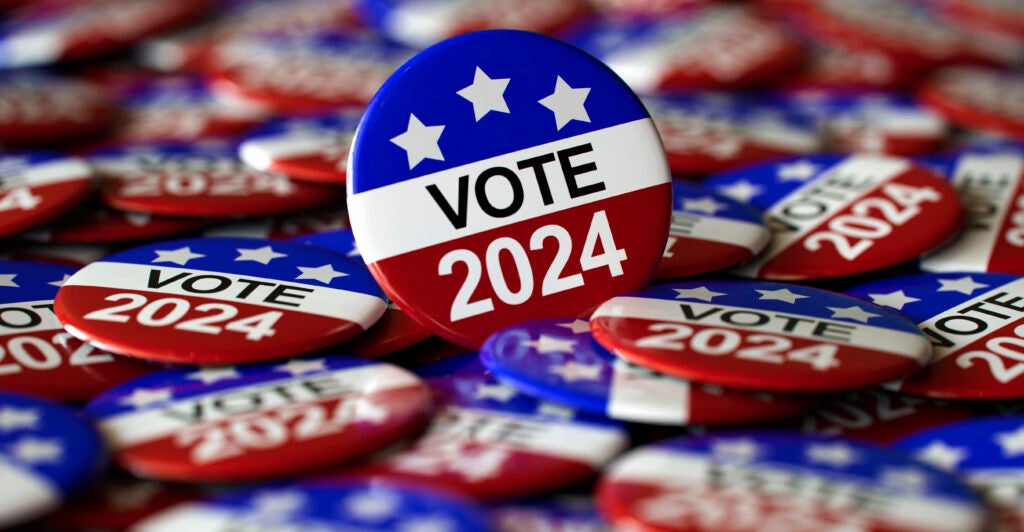A measure requiring proof of U.S. citizenship to vote in federal elections remains stuck in the Senate, but similar efforts will be on the ballot this November in eight states.
States set to vote on whether to amend their constitutions to prevent noncitizens from voting are Idaho, Iowa, Kentucky, Missouri, North Carolina, Oklahoma, South Carolina, and Wisconsin.
In previous election cycles, such amendments to state constitutions passed overwhelmingly.
The House last month passed the Safeguard American Voter Eligibility Act, or SAVE Act, which would require that states obtain documentary proof of U.S. citizenship from someone before he or she may register to vote. The bill would amend the 1993 National Voter Registration Act, known as the “motor voter law.”
The Democrat-controlled Senate, however, is unlikely to take up the House bill.
In the states, the proposed constitutional amendments in effect would prevent local governments from expanding voting rights to noncitizens, as has occurred in California, Maryland, and Vermont.
“States can take action constitutionally to protect citizen voters,” Kerri Toloczko, executive director of the Election Integrity Network, told The Daily Signal.
“Opponents [of banning noncitizen voting] say it’s already illegal for foreign nationals to vote. It’s also illegal to steal a car,” Toloczko said. “There are so many loopholes in the National Voter Registration Act.”
As noted in my book “The Myth of Voter Suppression,” there have been numerous adjudicated cases of foreign nationals registering to vote and voting in past elections.
A 1996 federal law specifically prohibits noncitizens from voting in federal elections for president or members of Congress. However, the law doesn’t dictate what local governments can do.
In addition, the 1993 National Voter Registration Act requires voter registration at states’ motor vehicle departments and social services agencies.
In a case involving an Arizona law, the Supreme Court ruled in 2013 that states can’t require proof of citizenship for federal elections, but may do so for state elections. Currently, Arizona keeps separate voter registration lists for state and federal elections.
“It’s not quite the SAVE Act in these states, but it is a marker to overcome bad law at the federal level,” Jason Snead, executive director of the Honest Elections Project, told The Daily Signal, referring to ballot initiatives to amend state constitutions.
“Most state constitutions say that ‘every citizen can vote,’” Snead added. “Activist groups say that doesn’t mean only citizens can vote. So this language clarifies that.”
In 2022, constitutional amendments requiring citizenship to vote were approved by 73% of voters in Louisiana and 77% in Ohio, according to Ballotpedia. In 2020, similar constitutional amendments were approved by 79% of voters in Florida; 77% in Alabama; and 62% in Colorado, a blue state. In 2018, 65% of voters in North Dakota approved such an amendment.
The Brennan Center for Justice, a liberal think tank affiliated with New York University that opposes voter ID and similar reforms, argued in an April analysis that laws targeting noncitizen voting are unnecessary.
“Every legitimate study ever done on the question shows that voting by noncitizens in state and federal elections is vanishingly rare,” wrote Sean Morales-Doyle, director of the Brennan Center’s voting rights program.
“That includes the Brennan Center’s own study of 42 jurisdictions in the 2016 general election,” Morales-Doyle added. “We found that election officials in those places, who oversaw the tabulation of 23.5 million votes, referred only an estimated 30 incidents of suspected noncitizen voting for further investigation or prosecution. In other words, even suspected— not proven—noncitizen votes accounted for just 0.0001 percent of the votes cast.”
Census data shows that 21.7 million potential noncitizens live in the United States as of 2022, while 18 states and the District of Columbia issue driver’s licenses to illegal immigrants, according to the Only Citizens Vote Coalition. Also, every noncitizen who is legally authorized to work in the U.S. is eligible to get a Social Security number.
“With a driver’s license and a Social Security number, any noncitizen can register to vote in any state UNLESS the state takes additional steps to verify U.S. citizenship,” the coalition’s website says.
When advocating passage of the SAVE Act, House Speaker Mike Johnson, R-La., noted that Virginia last year removed about 1,500 registrants from the voter rolls who were noncitizens, and 22% of them had cast ballots.
Massachusetts and Ohio both removed noncitizens from voter rolls in recent years. Georgia found that 1,600 noncitizens attempted to vote. In 2017, Pennsylvania Secretary of State Pedro Cortes resigned after the state admitted to registering illegal immigrants for several years.
No state constitutions explicitly allow foreign nationals to vote. By law, the District of Columbia and local jurisdictions in the states of California, Illinois, Maryland, and Vermont allow non-U.S. citizens to vote in local elections, but not in state or federal elections. This approach, however, requires election officials to keep separate lists of registered voters.
Advocates of election integrity argue that keeping separate lists can be difficult, and that noncitizen voters could slip through the cracks for state and federal elections.
New York City’s law allowing noncitizen voting in municipal elections was struck down in February by a federal appeals court.
In California, the cities of Oakland and San Francisco allow voting by noncitizens in local school board elections.
The District of Columbia allowed noncitizens to vote in all local elections, but faced bipartisan opposition as 42 House Democrats joined Republicans in attempting to block the city’s law. But the Senate took no action on the bill. The liberal editorial board of The Washington Post called the D.C. law “radical.”
Chicago has allowed noncitizens to vote in school board elections since 1989.
In Maryland, municipalities allowing foreign nationals to vote in local elections include Barnesville, Cheverly, Chevy Chase, Garrett Park, Glen Echo, Hyattsville, Martin’s Additions, Mount Rainier, Riverdale Park, Somerset, and Takoma Park.
In Vermont, three cities allow foreign nationals to vote: Burlington, Montpelier, and Winooski.
